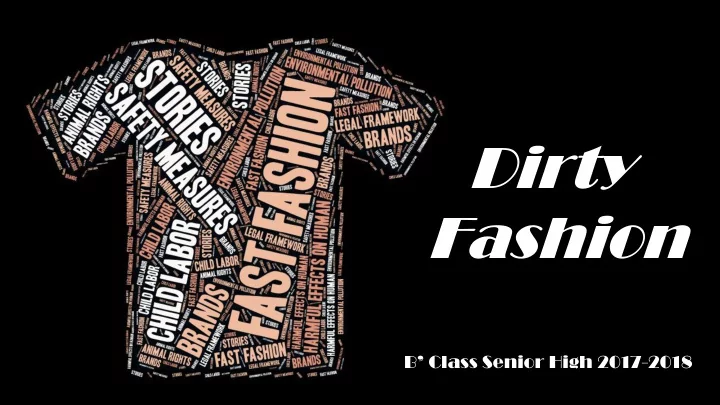

Dirty Fashion B’ Class Senior High 2017 -2018
In our Individual Work Team Work project we… In English Visit to the designer’s Vassilis Zoulias Atelier
Dir irty Fashion
Rana Plaza colla lapse pse, the e most fatal clothe thes-factory factory in incid iden ent in in mode dern rn his istory ry happ ppen ened ed be because se of a structura uctural l fail ilure e on Apr pril il 24th h 2013 13 in in Savar buil ildi ding, g, Bangl glade desh.
Dir irty Fashion
Fast Fashion Term of fast fashion : Phenomenon in the fashion industry whereby production processes are expedited in order to get new trends to the market as quickly and cheaply as possible. History of the term : The idea was that “quick response” could help the US textile industry work more effectively with retailers and stem the tide of production moving offshore. Its goal : Originally two fashion seasons: Spring/Summer and Fall/Winter. Fast forward to 2014 and the fashion industry is churning out 52 “micro - seasons” per year.
BIG BRANDS Well known clothes brands : In the majority of the factories: awful working conditions exploitation, people working more than 16h/day without even having a toilet break wages earned are too low to sustain workers children forced to work for more than 10 hours a day workers often beaten by their bosses
Dir irty Fashion
CONSUMERS WORKERS HEALTH
respiratory allergies SYNTHETIC problems DYES Neurological embryonal CHEMICALS misgrowth disorders SYNTHETIC cancer infertility CLOTHING
Dir irty Fashion
Textile Industry: Environmental Pollution Cotton : Water Pollution : • consumes enormous amounts of water • more than a half trillion gallons of fresh water are used throughout • is one of the most chemically dependent the textile dyeing process annually crops in the world • The dye wastewater is discharged Chemical Materials : into nearby rivers • Polyester and nylon Water into rivers: "highly caustic“ • are made from petrochemicals • Countries: China, India, Pakistan, are not biodegradable Turkmenistan, Brazil • Transportation of clothes: a container ship fueled by the dirtiest of fossil fuels which provoke water and air pollution.
Dir irty Fashion
Animals die in the name of fashion They get killed for: -Their fur -Pelt
Dir irty Fashion
Working conditions and safety “I made this item you are going to buy but I didn’t get paid for it” • Working conditions have been improved since the Rana Plaza disaster, but not dramatically. • Most workers are women and Workers in children. Zara: Note garment Campaign industry • The buildings are not always properly designed for this use. • The government has also made legal changes that have helped increase Accidents the number of unions. due to destroyed • Recent Zara’s workers note campaign buildings in November
Dir irty Fashion
Life stories of the workers Selim Huynh Van Hai Workers in India Naseer a survivor of the collapse of Rana works in a large factory in Plaza, a garment factory in It is worth saying that many worked in a garment factory Vietnam. On a normal day, Hai Bagladesh. Selim, a 37-year-old on the seventh floor of Rana textile workers in Indian works a ten-hour shift, starting father, heard a tremendous noise Plaza. When it collapsed, he at seven in the morning and factories earn so little that as the world plunged into finishing at five in the afternoon. was trapped for around 6 an entire month's wages darkness. He was thrown to the He usually works extra time if he hours. Naseer created his own would not buy a single item floor alongside fellow workers. can. There are from two to four factory, as he has planned. Some died quickly when concrete they produce. hours on top of his normal shift. and metal crushed them as the building imploded.
Dir irty Fashion
Legal Framework There are laws that are established in order to protect workers’ rights but they are constantly violated by most enterprises, in countries like: Pakistan Bangladesh China India Philippines
Dir irty Fashion
Causes • Poverty • Lack of education • Fast fashion • Tasks better suited to children
Protection United Nations UNICEF International Labor Organisation
Solutions • Use organic cotton – wear clothes 100% cotton made • Reduce – Reuse – Recycle • Consumer awareness • Enhance organizations trying to improve working conditions & empower workers • Avoid clothes made of animal fur
Dirty Αθανασιάδη Βασιλεία, Βερβίτα Έλενα, Βλάχου - Σακελλαρίου Νικολέτα, Fashion Δεληκούρα Αναστασία, Καραχάλιου Παρασκευή, Κοζή Ευγενία, Ματζιάρ Ναταλία, Μεταξάς Ζήσης, Μουστάνης Νίκος, Μυλωνόπουλος Ιάσων, Σαμαράς Γιώργος Teacher: Maria Bastaki
Recommend
More recommend